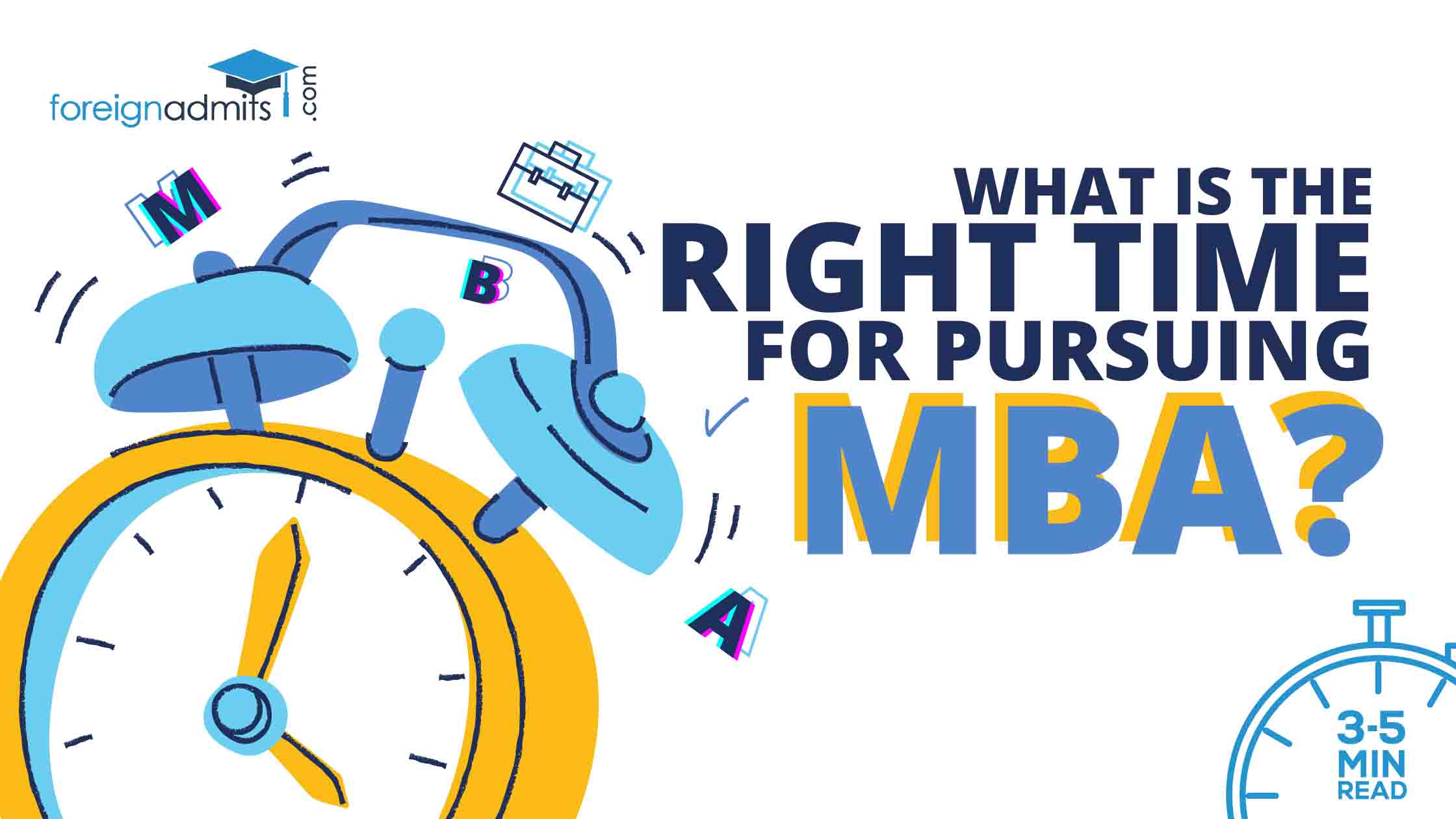Timing, planning, and management are the most important aspects of career development. Without setting up career goals and planning out to achieve them, your life can become a mess. Also, planning gives direction, which in turn gives you focus on particular aspects of life. Thus, it is important to know the right time to do things to not feel lost or waste your time. Hence, we have brought you a blog on the right time for pursuing MBA. MBA is different from the various other Masters in the field. Further, there are types of MBAs that are suitable for particular people of a particular experience. Thus, it is important to know when and which MBA should you pursue.
Right after your bachelor’s, you tend to seem a little confused as all the possible options lie in front of you. First, you can choose to pursue MBA. Second, you can start working and gain experience. Third, you work and study after the appropriate experience is achieved. Well, all these options might seem confusing, but there has to be one among them that you can choose. Read till the end to find out.
[widgets_on_pages id=”Masters”]
Pursuing MBA Right after Bachelor’s Degree
It is really tempting to continue with your higher studies right away. It seems like you are saving your time. However, moving into MBA without any work experience is not the right choice. Also, pursuing MBA too late is not a good option as you have wasted years working at the same spot while you could have moved up the ladder.
Also read: Low-cost MBA in Canada for Indian students.
Now the question is, why can you not pursue MBA right after your bachelor’s degree? The answer to this is that you can go for it, but you will not be admitted to the top business schools. All top business schools and institutes need at least 3 to 5 years of work experience before admission. Also, work experience before MBA teaches and prepares you to better understand your MBA studies. Further, top business schools help you in building contacts and broadening your network. Thus, you need to get admission to a top business school and gain some work experience before fulfilling their eligibility criteria. The average age of the MBA students in Harvard Business School is 27. It suggests that they have at least 5 years of work experience.
Even if you are the top-ranking student in the class in your Bachelor’s course, you will never know the difference between a manager, administrator, or a leader. You will also not have time management skills, completing tasks before deadlines, experiencing a demanding boss, etc. Thus, bookish knowledge can only prepare you 50% while the rest depends on your job’s learnings. The only advantage of doing an MBA without any work experience is that you can grasp your studies much faster than others and avail yourself of the benefit of placements to kick your career.
Also read: MBA in USA for Indian students.
MBA after a work experience
Ideally, 3 to 5 years of work experience is a requirement for pursuing MBA from the top business schools. You can gain skills like analysis, decision making, time management, leadership, building relationships, etc. These skills are important for MBA and prepare you for better lucrative and glamorous jobs after MBA. Also, it will enhance your personality. Additionally, if you are intelligent, honest, and hardworking, you can easily reach heights in your career.
Thus, the advantages of doing a job before an MBA are many. It is the most ideal option for students. Also, it will help you to better understand your MBA lecture. Further, your job has already prepared you financially for the top business school. Hence, you don’t need to worry about the fees. Additionally, the ROI from top institutes after MBA is really high. They have better placement opportunities and build a better network.
Recruiters also prefer students with work experience as opposed to MBA’s without work experience. Thus, you have higher chances of gaining employment.
[widgets_on_pages id=”Masters”]
Pursuing MBA along with your job
Though it seems a little hectic, the last option is doing an MBA along with your job. This option is best for candidates who don’t want to invest a lot of time in their studies. But at the same time, these candidates should have at least 10 to 12 years of work experience. For such candidates, there are rushed MBA programs. As they have already learned most of the concepts from their experience, they need not study each subject in detail.
Thus, people with little work experience cannot survive this part-time MBA or executive MBA programs. To sum up, this option is the best for candidates who are too late for a regular MBA. This is a relatively newer option, but it is becoming popular due to the ease of studying and its fast-paced syllabus. At the same time, it promises you a better position in the company, so why not give it a try.
Also read: Everything you need to know about executive MBA.
In conclusion, there are three paths before you. According to your work experience, age, and goals, you can choose the path that is best suited for you. We have mentioned the pros and cons of each of them. Also, we have mentioned the suitable candidates for each path. If you still have any difficulty in making a decision, then contact our mentors.
